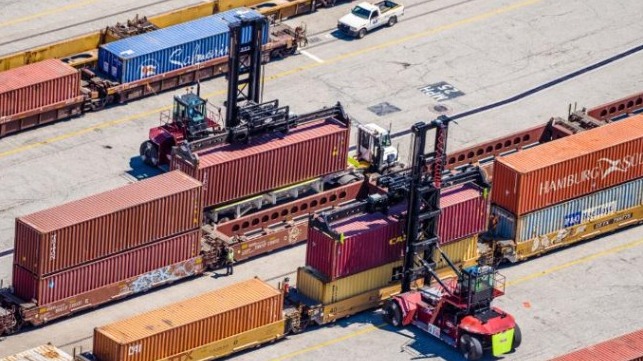Flood of Import Containers Disrupts U.S. Intermodal Rail

The flood of import cargo arriving at the main U.S. gateway ports has started to overwhelm the intermodal rail network, which carries a substantial share of the import volume to inland markets in the Midwest.
Number-two ocean carrier MSC announced Monday that with record-setting import volumes still pouring into the U.S., rail operators have started to meter inbound trains from both West Coast and East Coast ocean terminals.
Starting Sunday and extending for the next two weeks, BNSF will be reducing import rail traffic from the U.S. West Coast ports of Los Angeles and Long Beach, MSC said. Oakland and Tacoma are not currently affected.
The line said that this slowdown will affect delivery of cargo that is bound for the BNSF midwest rail hub in Chicago. Affected boxes will be held at marine terminals until the restriction is lifted. The line cautioned that any change of destination for a given shipment may be challenging.
On the East Coast, BNSF is now metering container shipments from PNYNJ to Chicago, Cleveland and Indianapolis, and this is set to continue with no specific end date. "If the current scenario does not improve, these temporary measures may very well spread to other ramps," MSC cautioned.
On Southern California-to-Chicago routes, BNSF has already been diverting some inbound trains onto alternate tracks so that they arrive late, or parking them for extended periods on sidings to keep them out of the way until there is room at Chicago. A large part of the problem lies in a shortage of chassis to carry arriving containers away from the intermodal rail hubs and on to their final destination. This is in large part because customers are not unpacking their boxes and returning the chassis as quickly as they used to, leaving the chassis pool tied up off-site, according to BNSF.

that matters most
Get the latest maritime news delivered to your inbox daily.
The main intermodal hubs in Chicago have no straddle carriers or container storage stacks: they load each box right from the rail car onto a chassis for quick removal. While efficient, the system relies on an adequate and continuous supply of chassis - a supply that is currently under strain.
Rail line Union Pacific has enacted a similar pause, halting all shipments of international containers from West Coast marine terminals to its main Chicago hub. The pause is intended to help the facility work out a backlog of cargo and to free up empty rail cars. UP may also restart a second, recently-idled hub complex in the Chicago area to deal with the extra traffic, according to Trains.com.
